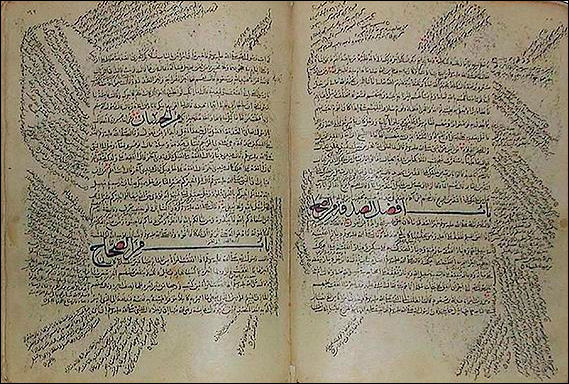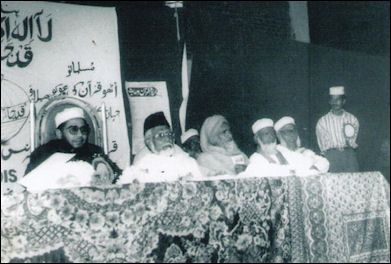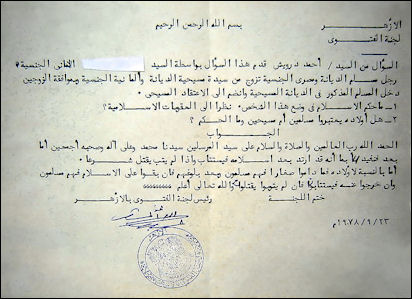Home | Category: Islam and the Qur’an
QUR’AN SCHOLARSHIP

Election of Othman as the 3rd Caliph
The Qur’an is primarily a collection of revelations voiced by Muhammad compiled after his death with the help of followers, some of who wrote down Muhammad’s accounts of the revelations or memorized them. According to the Metropolitan Museum of Art : Toward the end of his life, Muhammad began to create a physical copy of the revelations, but he was unable to complete this project before his death in 632 A.D. In the following years, his most trusted companions undertook the task of collecting them from written and oral sources. [Source: Maryam Ekhtiar, Julia Cohen, Department of Islamic Art, Metropolitan Museum of Art \^/]
Scholarship, theology and elaboration of doctrine came late to Islamic primarily because what was stated in the Qur’an was accepted without asking how or why. Simple piety, duty, following commands and the fear of God was enough. The Qurʾan that is read and recited today differs little from the Qurʾan from 7h century. Muhammad could neither read nor write, so his followers acted as secretaries and recorded his revelations as the Prophet recited them. Early on, writing down the Qurʾan was not a high priority as the goal of Muslims at that time was to memorize it. [Source: Encyclopedia.com]
This changed during the rule of Abu Bakr, the first Muslim caliph, when numerous Muslims who had memorized the Qurʾan were killed in a rebellion. Concerned that the Qurʾan could be lost, Abu Bakr had it recorded on paper, an innovation newly introduced from China. Later, the third caliph, Uthman ibn Affan, learned that many non-Arabs were recording their own versions of the Qurʾan, with variations in pronunciation and spelling. Uthman, concerned that among all these competing versions the true Qurʾan would be lost, ordered production of an official version, with one copy sent to every major Muslim city. Scribes in those cities produced additional copies for use in that city, and faulty copies were ordered burned. Two of these official copies, called the Usmani Qurʾans, are preserved in museums in Turkey and in Tashkent, Uzbekistan. They are the source of the text used in the twenty-first century.
Websites and Resources: Islam IslamOnline islamonline.net ; Institute for Social Policy and Understanding ispu.org; Islam.com islam.com ; Islamic City islamicity.com ; BBC article bbc.co.uk/religion/religions/islam ; University of Southern California Compendium of Muslim Texts web.archive.org ; Encyclopædia Britannica article on Islam britannica.com ; Islam at Project Gutenberg gutenberg.org ; Muslims: PBS Frontline documentary pbs.org frontline
Qur’an (Quran, Koran) and Hadith: Quran translation in English alahazrat.net ; Quran in Easy English, Urdu, Arabic and 70 other languages qurango.com ; Quran.com quran.com ; Al-Quran.info al-quran.info; Quranic Arabic Corpus, shows syntax and morphology for each word corpus.quran.com ; Word for Word English Translation – emuslim.com emuslim.com/Quran ; Digitised Qurans in the Cambridge University Digital Library cudl.lib.cam.ac.uk ; Sunnah.com sunnah.com ; Hadith – search by keyword and by narrator ahadith.co.uk
RECOMMENDED BOOKS:
“The Holy Quran” Arabic Text English Translation (English and Arabic Edition) Leather Bound
Amazon.com ;
“The Qur'an: A New Translation” by M. A. S. Abdel Haleem Amazon.com ;
“The Holy Qur'an with English Translation and Commentary” by Maulana Muhammad Ali Amazon.com ;
“Towards Understanding the Qur'an: English/Arabic Edition (with commentary in English) by Sayyid Abul A'la Mawdudi and Zafar Ishaq Ansari Amazon.com ;
“The Study Quran: A New Translation and Commentary” Amazon.com ;
“The One and the Many: The Early History of the Qur'an” by Francois Deroche and Malcolm DeBevoise Amazon.com ;
“Revelation: The Story Of Muhammad” by Meraj Mohiuddin Amazon.com ;
“The Critical Qur'an: Explained from Key Islamic Commentaries and Contemporary Historical Research” by Robert Spencer Amazon.com ;
“The History of the Qur'anic Text: From Revelation to Compilation, a Comparative Study with the Old and New Testaments” by Muhammad Mustafa al-ʿAzami Amazon.com ;
“The Qur'an - with References to the Bible: A Contemporary Understanding” by David Hungerford and Safi Kaskas Amazon.com ;
“Hadith: Muhammad's Legacy in the Medieval and Modern World” by Jonathan A.C. Brown Amazon.com ;
“Sahih al-Bukhari”: (All Volumes in One Book) English Text Only by Imam Al Bukhari and Muhammad Mohee Uddin Amazon.com
Raising Questions About How the Qur'an was Assembled
Not all scholars agree with the standard assessment of how the Qur'an was assembled. In “ Hagarism: The Making of the Islamic World” , the controversial scholar Michael Cook wrote, "There is no hard evidence for the existence of the Qur’an in any form before the last decade of the seventh century." Cook also asserts that the stories about Muhammad migration to and from Mecca evolved long after he died.
Many Scholars say that writings and stories from other religions such as Christianity, Judaism and Zoroastrianism were absorbed into the Qur’an. Some claim that much of the material in the Qur’an was fabricated to support Muslim mythology and help spread the belief.
Gerd R. Puin, a specialist in Arabic calligraphy at Saarland University, told Atlantic Monthly, "My idea is that the Qur’an is a kind of cocktail of texts that were not all understood even at the time of Muhammad. Many of them may even be a hundred years older than Islam itself. Even within the Islamic traditions there is a huge body of contradictory information."
Muslims have traditionally believed that God created all things and that studying these things would offer greater insight into God. Thomas Lipman wrote in Smithsonian: "The Qur’an encourages scholarly inquiry. It teaches that all nature is a manifestation of God, and that inquiry into natural phenomena, such as why a bee makes honey, will demonstrate the truth of Muhammad's message."
Texts of the Qur’an
Charles F. Gallagher wrote in the “International Encyclopedia of the Social Sciences”: The generally earlier Meccan chapters are distinguishable by their apocalyptic style, their use of a strongly fashioned rhymed prose, their relatively simple subject matter, and their poetic expression of religious symbolism. In their imaginative grasp and their masterly use of Arabic they reveal a genuine prophetic genius. In comparison, the later Medinan chapters, which include moral maxims, legal proscriptions, and historical narratives that are sometimes taken from Christian and Jewish sources, suffer from a dilution of this vigorous style. [Source: Charles F. Gallagher, “International Encyclopedia of the Social Sciences”, 1960s, Encyclopedia.com]
.jpg)
Bosnia madrassah in 1906 The essential dogma of the Qur’an is that of the unity of God: “Say God is one, God the eternal. He hath not begotten nor was he begotten, and there is none equal to him.” The believer is enjoined to accept the envoys of God and the scriptures they have revealed, beginning with Adam and continuing with Noah, Abraham, Moses, and Jesus, to the final revelation of Muhammad. Running through the entire work are two motifs: one envisions an impersonal, remote, and majestic deity, who evokes in the believer a sense of awe and humility; the other conceptualizes the Divine Spirit in terms of hope and mercy. Among the most numerous epithets for God in the Qur’an are those describing him as compassionate and merciful, and while a theme of fiery destruction for the sinful is preached in some Meccan verses, others rank among the purest expressions of trust in divine love.
Suras (often written as surah or surrah) are chapters of the Qur’an. According to Encyclopedia.com: They are arranged roughly according to size rather than chronological order . The longest ones tend to appear early in the Qurʾan, while the shortest ones, some consisting of just a handful of lines, appear at the end. Muslims also distinguish between two groups of suras. One group is called the Meccan suras because they were written in the city of Mecca. These "Meccan revelations" were the earliest ones. Their main theme was Muhammad's opposition to idolatry and superstition (a belief or fear based on the unknown), as well as the suffering and hardships endured by past prophets. These suras were recorded in the earliest years of Islam, before Muhammad and his followers fled Mecca for Medina. Later suras, called the "Medinan revelations," focus on how to build an Islamic society. These contain laws pertaining not only to religious doctrine (set of beliefs), philosophy (thought), and morality (good behavior) but also to inheritance, marriage and divorce, criminal punishments, statecraft, and numerous other topics.
Early Debates on the Qur’an
The Qurʾan is written in a combination of different literary styles, including prose and rhymed poetry. The language, classical Arabic, continues to be used as a literary language, a standard of poetic expression for writers in Arabic.
According to the “Encyclopaedia Judaica”: The Qur’an is considered to be the literal word of Allah. Muslim theologians debated whether it has existed since all eternity and is uncreated (ghayr makhluq), or was created (makhluq) at a certain point in time. Perceived as divine in origin, its style is considered inimitable (muʿjiz) in the sense that no human being is capable of producing a book of so sublime a stylistic standard. This is the dogma known as iʿjaz al-Koran, the idea that the Qur’an renders human beings unable to imitate it. [Source: Haïm Z’ew Hirschberg, “Encyclopaedia Judaica”, 2000, Encyclopedia.com]
The distinctive character of Qur’anic style is unmistakable; from the secular vantage point it may derive from the fact that the Qur’an is the only extant literary work from seventh-century Arabia. Although the Qur’an considers itself as "a book in which there is no doubt" (Koran 2:2) and as a revelation in "clear Arabic language" (Koran 26:195), many verses are difficult to understand and the book has inspired a vast literary corpus of exegesis (tafsir). Once the meaning of a verse was agreed upon by mainstream exegetes, the accepted meaning acquired an uncontested normative value in Muslim law and piety.
Understanding the Qur'an
“Despite repeated assertions to the contrary," Toby Lester wrote in Atlantic Monthly, "the Qur’an is often extremely difficult for contemporary readers — even highly educated speakers of Arabic “to understand. It sometimes makes dramatic shifts in style, voice and subject matter from verse to verse, and it assumes a familiarity with languages, stories and events that seem to have been lost even to the earliest of Muslim exegetes." [Source: Toby Lester, Atlantic Monthly, January 1999]
The archaic Arabic and flowery verse add to difficulty of understanding the Qur’an. H. A. R. Gibb wrote in the Encyclopedia of World Religions: the sura “are a mosaic of passages of revelation, uttered by Muhammad at different times and on different occasions, somewhat unevenly complied from oral and written records.”

Hadith Al-Nabawi
Kenneth Woodward wrote in Newsweek: “To read the Qur’an is like entering a stream. At almost any point one may come upon a command of God, a burst of prayer , a theological pronouncement, the story of an earlier prophet or a description of the final judgement. Because Muhammad’s revelations were heard, recited and memorized by his coverts, the Qur’an is full of repetitions. None of its...chapters focuses on a single theme...There is no chronological organization — this is God speaking, after all, and his words are timeless.”
Many Muslims find the Qur’an to be confusing. Bookstores in the Muslim world are full of books that attempt to explain what the Qur’ans means on topics such as women, marriage, justice or war. The Prophet himself said that God reveals himself through signs whose meaning needs to be unraveled.
But not everything is spelled in the Qur’an and the sacred book has been "interpreted." Quotes, for example, that simply suggest that women be modest are used as a justification for the wearing of the veil. Even in ultra-conservative Saudi Arabia there various "levels and shades" of conservatism that are related to different interpretations of the Bible.∞∞
The Qur’an specifically warns against literal interpretations, acknowledges the potential for misinterpretation and recognizes the difficulty on fathom it true meaning. According to Sura 3:7, “Some...verses are precise in meaning — they are the foundation of the Book — and others ambiguous. Those whose hearts are infected with disbelief follow the ambiguous part, so as to create dissension....no one knows its meaning except God.”
As with the Bible, quotes from the Qur’an and the Hadiths (a collection of sayings and deeds of the Prophet) can be used to justify almost anything. The quotes used by an individual usually says more about the individual than the Qur’an. Because there is no established hierarchy or excommunication people have a large amount of leeway to interpret the Qur’an anyway they like. But questioning the Qur’an or the Hadiths or poking fun at anything to do with Islam is another matter. This can result in charges of blasphemy. Look at what happened to Salman Rushdie.
A self-confessed “haddith hurler,” told U.S. News and World Report he found scriptures to rail against trousers, mixed gatherings and to justify the destruction of his sister’s Rod Stewart tapes. “In those days my judgments were as quick as a gun.” He said he got his comeuppance when he began serious religious training. If I cited a single hadith , he said, “I would be challenged with 10 others plus the precedent of [the Prophet’s] Companions and a meticulous accounting of the evidence at hand.”
Ambiguities in the Qur’an
As is true the Bible and many other religious texts, the Qur’an is full of inconsistencies and contradictions. In number of matters the Qur’an is unclear or incomplete, and according to Puin "every fifth sentence or so simply doesn't make any sense” and “other times is contradictory." The Qur’an teaches both pre-destination and free will and each is emphasized to fit a particular point that is being made.

Karnataka Quran Hadith Conference Lester wrote, "Its apparent inconsistencies are easy to find: God may be referred to in the first and third person in the same science, divergent versions of the same story are repeated at different points in the same texts; divine rulings occasionally contradict one another."
"In this last case, the Qur’an anticipates criticism and defends itself by asserting the right to abrogate its own message ("God doth blot out/ Or confirm what he pleaseth")." Conservative Islamic scholars defend unclear passages as messages from that are simply "incompressible" to humans.
Islamic scholars in ther centuries after Muhammad's death were aware of the problems. They even catalogued "unfamiliar vocabulary, seeming omissions of text, grammatical incongruities and deviants." Theological debate was vigorous; the metaphorical nature of the Qur’an was discussed; but in the end all that was thrown out and “t'jaz” (the "inimitability” of the Qur’an") became official doctrine.
Difficulty of Qur’an Scholarship
R. Stephen Humphreys, a professor of Islamic Studies at the University of California at Santa Barbara, told Atlantic Monthly, "And ideally — though obviously not always in reality — Islamic history has been an effort to pursue and work the commandments of the Qur’an in human life."
Conservative Muslim scholars like to point out the historical nature of the Bible but frown upon similar scrutiny of the Qur’an. R. Stephen Humphreys, a professor of Islamic Studies at the University of California at Santa Barbara, told Atlantic Monthly, "To historcize the Qur’an would in effect deligitimize the whole experience of the Muslim community. The Qur’an is the charter of the community, the document that called it into existence...If the Qur’an is a historical document, then the whole Islamic struggle of fourteen centuries is effectively meaningless." [Source: Toby Lester, Atlantic Monthly, January 1999]
Qur’an scholarship can be a risky endeavor. Scholars have to tread lightly and be careful about what they say out of risk as being condemned of apostasy or blasphemy and in extreme cases facing a death penalty. In fairness though, scholars who study the Bible and the Torah also are not viewed kindly by conservative Christians and Jews.
Muhammad Arkoun, an Algerian and professor of Islamic Studies at Paris University told Atlantic. Study of the Qur’an is "a very sensitive business" with major implications. "Millions and millions of people refer to the Qur’an daily to explain their actions and to justify their experience."
Many prestigious religions institutions have been infiltrated by fundamentalists who denounce their teachers for addressing “forbidden” subjects and having open discussions on religious matters rather learning by memorization. Some professors have been hounded out of their jobs. Some even have been arrested and attacked by fundamentalist thugs. Scholars that taken controversial positions have been forced into exile or died under mysterious circumstances.
Egyptian Scholar Accused of Apostasy

Apostasy document Islamic extremists labeled Dr. Nasr Hamed Abu Zeid, a professor of Islamic studies at Cairo University, a heretic in May 1993 for writing historical papers on 8th century Islamic thinkers with "discussions resembling atheism." Extremists then proceeded to ruin his career and took him to court to get him to divorce his wife. To avoid being put on trial for a crime that carried the death penalty he fled to the Netherlands, where he continues to live. [Source: Mary Anne Weaver, New Yorker, June 8, 1998]
Nasr Abu Zeid had been accused of apostasy, an abandonment of the Islamic faith, by clerics at al-Azahar University. His case was to be heard before an Egyptian court. The evidence against him was an academic paper that discussed whether reference to angels, devils and the throne of God should be taken literally or viewed as metaphors.
Image Sources: Wikimedia Commons
Text Sources: Internet Islamic History Sourcebook: sourcebooks.fordham.edu ; “World Religions” edited by Geoffrey Parrinder (Facts on File Publications, New York); Arab News, Jeddah; “Islam, a Short History” by Karen Armstrong; “A History of the Arab Peoples” by Albert Hourani (Faber and Faber, 1991); “Encyclopedia of the World’s Religions” edited by R.C. Zaehner (Barnes & Noble Books, 1959); Metropolitan Museum of Art; National Geographic, BBC, New York Times, The Guardian, Al Jazeera, The New Yorker, Associated Press, AFP, Library of Congress and various books and other publications.
Last updated March 2024
